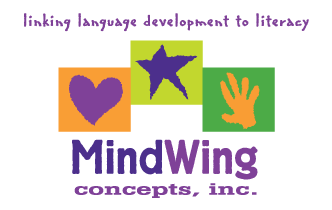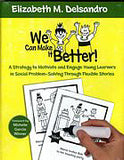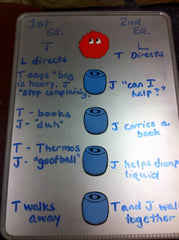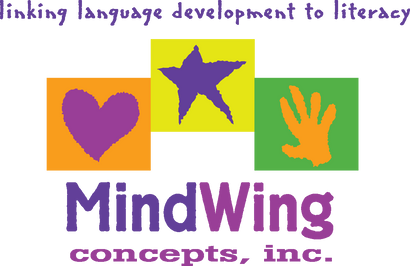Menu
-
- Home
-
About Us
-
The Approach
-
Linking Language & Literacy
-
MindWing Learning
-
Learning Resources
-
SHOP
-
Blog
-
- About MindWing
- Our People
- Contact Us
- Your Account
- Login
-
United States (USD $)

“Make It Better” through Storytelling
by Maryellen Rooney Moreau October 25, 2010 3 min read
 It’s really exciting when a speech-language material is published that provides clinicians with a ready-to-go resource that jibes well with strategies we already have been teaching. Such is definitely the case with the excellent We Can Make it Better program recently released by Think Social Publishing and written by Speech-Language Pathologist Elizabeth Delsandro. We Can Make it Better is a set of 20+ stories in which social interactions go quite wrong due to “unexpected behaviors” by one of the characters. The materials and activities unfold in a very logical therapeutic structure that challenges students to “make it better” by deciding alternative actions for the characters, “rewrite” the story as a more positive “Second Edition” and act it out, thus providing a great context for teaching social problem solving.
It’s really exciting when a speech-language material is published that provides clinicians with a ready-to-go resource that jibes well with strategies we already have been teaching. Such is definitely the case with the excellent We Can Make it Better program recently released by Think Social Publishing and written by Speech-Language Pathologist Elizabeth Delsandro. We Can Make it Better is a set of 20+ stories in which social interactions go quite wrong due to “unexpected behaviors” by one of the characters. The materials and activities unfold in a very logical therapeutic structure that challenges students to “make it better” by deciding alternative actions for the characters, “rewrite” the story as a more positive “Second Edition” and act it out, thus providing a great context for teaching social problem solving.
To be quite honest, social problem solving has been an area that, when providing a rating each semester in my private practice’s progress notes, I have wondered if I adequately assessed or addressed. Of course we have “teachable moments” in sessions where problems arise between students, and discussions of problems in the real world, but I have been wanting for a fun material that could foster some take-home skills in this area!
It is wonderful how We Can Make It Better perfectly compliments some of the programs I am using already with students, namely, of course, Story Grammar Marker and Social Thinking. In using the program over the past several weeks, I have found the narrative context in which stories are presented is motivating and amusing to my students, and it is very easy to weave in use of the SGM as we recap the presented stories, analyze the actions of characters, and develop an alternative story script and outcome. Many Social Thinking concepts, such as “Expected/Unexpected” behaviors, “guessing plans” and “smart guesses” are also natural targets within discussions of the stories.

The program’s generous number of stories (and tips on how to write your own) make it ideally suited for classroom and group programming, and the accompanying CD-ROM with stories and forms in electronic format opens many possibilities. For example, I have been able to use an LCD projector to show the stories “writ large” on the wall, an attention-grabber for our students, and PDF files on the CD can be easily inserted into programs such as PowerPoint so I can annotate our group discussions (i.e. inserting text boxes to display alternative actions that kids suggest, then making the best choice, after discussion, appear in green font). Additionally, using a Flip Video camera to record the role-plays has been a great motivator for kids in the “Act it Out” portion, and provides great feedback on scripting, body language and other nonverbals.
Even if you are only in the early phases of using the SGM, I highly recommend We Can Make It Better as a great context for developing early learners’ storytelling and problem solving skills.
Maryellen Rooney Moreau
Maryellen Rooney Moreau, M.Ed., CCC-SLP, is the founder of MindWing Concepts. She earned her Bachelor of Arts degree in Communication Disorders at University of Massachusetts at Amherst as a Commonwealth Honors Scholar, and a Masters of Education in Communication Disorders at Pennsylvania State University. Her forty-year professional career includes school-based SLP, college professor, diagnostician, and Coordinator of Intervention Curriculum and Professional Development for children with language learning disabilities. She designed the Story Grammar Marker® and has been awarded two United States Patents. She has written more than 15 publications and developed more than 60 hands-on tools based on the SGM® methodology. Maryellen was awarded the 2014 Alice H. Garside Lifetime Achievement Award from the International Dyslexia Association, Massachusetts Branch.
Leave a comment
Comments will be approved before showing up.
